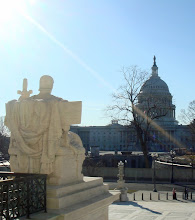Week 31: Emergency Powers
I do not think it would be hyperbole to say that this election year has been extraordinary. It seems safe to say that the incumbent is a colorful character. His competitors have been a collection of characters who have all tried to outdo one another in terms of pseudo-socialist ideology. Layer on an impeachment and now a pandemic that is, in essence, shutting down our nation (we have yet to see if that will move from essence to fact), and it becomes apparent that we are living through some remarkable times.
Article I, Section VIII of the Constitution, includes what is commonly referred to as the “Necessary and Proper Clause,” which grants Congress the power “to make all Laws which shall be necessary and proper for carrying into Execution the foregoing Powers, and all other Powers vested by this Constitution in the Government of the United States, or in any Department or Officer thereof.”
On September 14, 1976, the 94th Congress of the United States enacted such a law. The National Emergencies Act (NEA) was intended to provide structure and consistency regarding national emergencies and the power of the government, namely the Executive. Prior to the NEA, many presidents had declared national emergencies and assumed certain powers to manage those emergencies. Of those declarations, many were challenged in the courts. Title I of the act provided for the orderly termination of all national emergencies then in effect or continuance under the provisions of the new act.
The NEA grants the President more than 130 emergency powers, most of which may be used without Congressional approval upon the declaration of an emergency. The powers are sweeping.
Another example of legislation that empowers the President in times of emergency, which you may be hearing about in the news, is the Stafford Act. Enacted by the 100th Congress of the United States, the act is designed to provide federal assistance during a natural disaster. It also provides sweeping authority to the Executive.
As our nation and the world deal with COVID-19, we are seeing the various actions that national and local governments are taking to combat the virus. While I will not opine on the measures themselves, I would like to offer for your kind consideration the philosophical underpinnings of such authority. In so considering, we may be more fully informed at the ballot box when determining which candidate will better use and respect the emergency powers vested in the presidency.
In the United States, the notion of a tyrant or dictator is anathema to most citizens and most certainly to our founding principles. In Federalist 69 and Federalist 70, Alexander Hamilton painstakingly drew distinctions among the proposed roles and responsibilities of the President, those of the king of Great Britain and those of the governor of New York (which is a timely and interesting coincidence, given the restrictions being enacted in New York presently). He then explored the risks and benefits of a strong versus weak executive. Hamilton was making the case for executive authority to be vested in one elected citizen: the President. The Framers believed this would facilitate efficient action, balanced, of course, by the other co-equal branches of government, namely the Legislative and Judicial branches.
Over the course of time, Congress would enact necessary and proper legislation that expanded, and sometimes restricted, the authority of the President. Today, as mentioned above, that authority is not without significant breadth and depth. One indicator to consider is the number of executive orders issued by a president. In my lifetime (1972-present), the most prolific presidents in terms of producing executive orders are Jimmy Carter with an average of 80 per year in office and Gerald Ford with an average of 69.1 per year in office. The two presidents with the fewest executive orders per year in office were Barack Obama (34.6) and George W. Bush (36.4). Specific to declarations of national emergency, there are currently more than 30 active declarations, dating back to President Carter’s Executive Order 12170, which freezes Iranian government assets, and up to President Trump’s Proclamation 9994, which puts in place COVID-19-related travel restrictions.
In national emergencies, the President – any President – may activate military forces, marshal and direct the efforts of the private sector, enact curfews and suspend rights, to just scratch the surface of presidential authority.
Each generation faces its monumental challenge. Perhaps COVID-19 is ours. When facing such challenges, is the character of leadership a matter of consequence? I believe it is.
In the 59th chapter of the Tao Te Ching, Lao Tzu discusses the importance of moderation and simplicity in governing one’s life and in governing others. If a person understands this and understands the obstacles that stand in the way of moderation and simplicity, that person can be a good leader. In Federalist 57, James Madison writes about the character of leaders. Granted, Federalist 57 addresses charges levied against the Constitution’s plan of representation in the House of Representatives, but the characteristics Madison describes seem to be apropos to any leader. He writes, “The aim of every political constitution is, or ought to be, first to obtain for rulers men who possess most wisdom to discern, and most virtue to pursue, the common good of the society; and in the next place, to take the most effectual precautions for keeping them virtuous whilst they continue to hold their public trust.”
As we make our way through the COVID-19 pandemic, reflect on leadership. The two references above may be of use, or think about any other leaders you respect. Who is better, among the choices we have, to lead our nation. Hopefully, we’ll be past this crisis by November. Regardless, which candidate do you want, no, which candidate do you think (wanting denotes a decision made in part on emotion, thinking denotes a decision made on intellectual discernment) should occupy the Executive, cloaked in the mantle of sweeping authority? May we all choose wisely.

No comments:
Post a Comment